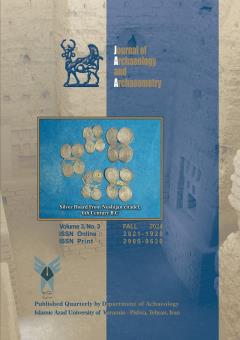The Role of the Ambassadors of Iran and the Netherlands in the Formation and Consistency of Political-Economic Relations between the Two Countries in the Safavid Era
الموضوعات :Babak Ghods 1 , Abasgholi Ghafar Fard 2 , Ali Bigdeli 3
1 - PhD student, Department of History and Archaeology, Central Tehran Branch, Islamic Azad University, Tehran, Iran
2 - Department of History, Central Tehran Branch, Islamic Azad University, Tehran, Iran
3 - Department of History, Shahid Beheshty Uiversity, Tehran, Iran
الکلمات المفتاحية: Safavids, Netherlands, Persian Gulf, Ambassadors, Trade, Silk ,
ملخص المقالة :
The Safavid era in Iran coincides with the growth of international trade relations and interaction with European East India companies. The Safavid kings wanted to establish relations with the East India Company, especially the Dutch East India Company, for various reasons. The Dutch were able to surpass their European counterparts in their dealings with the Safavid government by using economic, commercial and sometimes political initiatives, and what kept the Dutch ahead of their other European rivals was the commercial approach of the Dutch ambassadors and political representatives in their dealings with Iranian representatives and officials, the Dutch ambassadors and political representatives tried to spend on commercial activities and the opening of trade House in the ports of the Persian Gulf, so that they could monopolize the trade of the East. Accordingly, the purpose of this study is to study the role of the ambassadors of Iran and the Netherlands in the formation and consistency of political-economic relations between the two countries. The research method in this article is descriptive-analytical. The findings of the research show that the expansion of Iran's foreign relations with the Dutch government during the reign of Shah Abbas and the gradual access of the political representatives of this government to Iran, led to the prosperity of Iran's foreign trade. Iran's geographical position, was a suitable arena in which ambassadors and businessmen of different countries could pursue their trade goals in the shortest time and at the lowest cost.
Bayani, Khan Baba. (1930). A Letter from the Safavid Shah to the Dutch General Assembly. Education Monthly, 10th Year, November & December, No. 8 & 9: 32-37.
Bayani, Khan Baba. (1970). Iran-Netherlands Relations during the Embassy of Musa Beik. Historical Studies, Vol. 5, February and March, No. 6: 99-126.
Bayani, Khan Baba. (1971). Iran-Netherlands Relations in the Safavid Era. Historical Studies, Year 6, June and July, No. 2: 105-140.
Carre, Bartholomew. (2008). Abekar's Travelogue in Iran, 1672-74. Translated by Ahmad Bazmandegan Khamiri. Tehran: Golgasht.
Chardin, Jean. (1959). Travel. Translated by Mohammad Abbasi. Tehran: Amir Kabir.
Chardin, Jean. (2018). Jean Chardin's Travelogue. Translated by Eghbal Yaghmaei. Electronic version.
Delavale, Pietro. (2001). Travelogue. Translated by Mahmud Behforoozi. Tehran: Qatreh Publishing.
Figueroa, Don García de Silva. (1984). Travelogue. Translated by Gholamreza Sami'ei. Tehran: Nashreno.
Fleur, Willem. (1977). The First Ambassadors of Iran and the Netherlands. By Dariush Majlesi and Hossein Aboutorabian. Tehran: Tahori.
Frerer, Ranald. (2009). Trade in the Safavid Period. In the History of Iran (Safavid Period). University of Cambridge Research. Translated by Yaqub Ajand, 4th edition, Tehran: Jami.
Hedayat, Reza Gholi Khan. (1977). Embassy of Khwarazm. Tehran: Tahori Library.
Herbet, Marris. (No date). The Iranian embassy in the court of Louis XIV. Translated by Abdolhossein Vojdani. Tehran: Parvin Press Agency.
Houshang Mahdavi, Abdolreza. (2535). History of Iran's Foreign Relations from the Beginning of the Safavid Era to the End of World War II. Tehran: Simorgh Books Publications, affiliated to Amir Kabir Publications.
Ibn al-Farra, Abi Ali al-Hayen ibn Mohamed. (1947). The Book of the Apostles, the Kings, and Those Who Fit for the Message and the Embassy. Achieved by Salah al-Din al-Munajjid. Cairo: Press of the Committee of Authorship, Translation and Publishing.
Kempfer, Engelbert. (1984). Travelogue, translated by Keykavus Jahandari. Tehran: Kharazmi.
Olearius, Adam. (1984). Travelogue. Translated by Ahmad Behpour. Tehran: Ebtekar Publishing and Cultural Organization.


